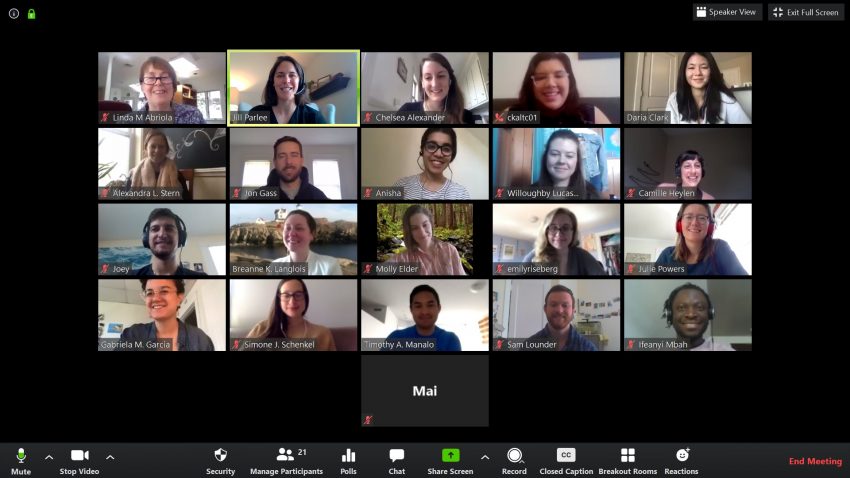2020 – 2021 TIE FELLOWS NEWSLETTER
Monday, May, 18th, 2020 News
Tufts Institute of the Environment is excited to announce our new TIE Fellows and TIE-SEI Interns!
The TIE Fellowship program, which supports and funds projects across disciplines, provides graduate students at Tufts the opportunity to conduct independent and interdisciplinary environmental research. This is an opportunity for students to explore topics relating to their focus area and obtain mentorship from Tufts faculty and TIE staff to help build expertise.
Despite the recent challenges we are facing due to COVID19, the new TIE Fellows continue to make progress on their research with the same amount of dedication and excitement. TIE Staff and Fellows recently held a Virtual Meet-and-Greet, instead of the usual in-person orientation brunch, where we welcomed the new 2020 - 2021 cohort. The event, which allowed the new Fellows to meet and converse with last years' cohort, saw the gathering of students from a variety of schools make and foster connections across disciplines.

This year’s Fellows come from a variety of backgrounds, representing multiple Tufts schools, such as the Graduate School of Arts and Sciences, the Fletcher School of Law and Diplomacy, the Cummings School of Veterinary Medicine, the School of Medicine, the Graduate School of Engineering and the Friedman School of Nutrition Science and Policy. The 2020 – 2021 TIE Fellows are conducting new and exciting research in areas including Conservation & Ecology, Climate Change, Water Science & Food Systems, Public Health, Animal Science, and Environmental Engineering, among others. This year’s Fellows are combining their intellectual curiosity with the amazing TIE network and Tufts resources in order to answer a fascinating set of research questions which will add to the global research body encompassing issues related to the environment. Here are a selection of the intriguing questions our TIE Fellows will be exploring through their research:
How is environmental pollution related to our health? Jonathon Gass from the Cummings School of Veterinary Medicine is looking to answer this question by researching contaminant exposures among gulls in Iceland using feathers collected from 2010-2018. His motivation to undertake this research lies at the intersection of environment and health as it has been demonstrated that contaminants greatly impact the immune systems of humans and animals; the health of our environments must be considered when addressing zoonotic disease dynamics. Bird feathers are excellent biomonitoring tools for contaminants in the environment and very little evidence has been generated to demonstrate the link between pollutants and infectious disease in wildlife.
Can agriculture provide solutions to battle climate change? Simone Schenkel, Friedman School of Nutrition Science and Policy, is working in collaboration with OpenTEAM, a collaborative community of farmers, scientists and researchers, engineers, farm service providers, and food companies that are committed to improving soil health and advancing agriculture’s ability to become a solution to climate change.
How can toxic algal blooms negatively affect ecosystems and food webs? Daria Clark’s research, from the Graduate School of Arts and Sciences, will examine the survival and growth of the marine snail, Crepidula fornicate (a local species of marine snail that has become a prolific invasive species in many parts of the world and is common in the Gulf of Mexico), and the effects of exposure to the algae K. brevis. Through their proposed research on C. fornicata larval and juvenile life stages, the team hopes to gain insight into how toxic algal blooms might affect the ecosystems and food webs of which C. fornicata is now an integral part.
TIE is also thrilled to welcome the two new TIE-SEI Interns, Mai Mahmoud and Anisha Nazareth, who will work on projects related to global environmental policy and practice with TIE’s longtime partner, the Stockholm Environment Institute (SEI). The TIE-SEI Internship, a collaborative effort between the two partners, offers two students the opportunity to conduct research and collaborate with SEI researchers on a specific project and assist with the development of sustainable environmental policy. Mai, who will assist with the “Water Nexus Modelling in Jordan and Morocco” initiative, is earning her Ph.D. in Economics and Public Policy, while Anisha, who is an M.S. student in Urban and Environmental Policy and Planning, will support the “Equitable Transitions for Developing Countries” project.
Visit Environmental Research Fellowship to learn more about this annual program and to follow the progress of this year’s TIE Fellows. Also look out for updates on the TIE-SEI Interns and their projects later this summer!
Congratulations and welcome to the new TIE Fellows and TIE-SEI Interns!